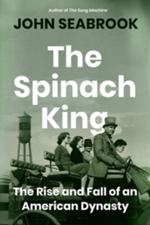They say behind every great fortune there is a great crime. At Seabrook Farms, the troubling American histories of race, immigration, and exploitation arise like weeds from the soil. Great Migration Black laborers struck against the company for better wages in the 1930s, and Japanese Americans helped found a “global village” on the farm after World War II. Revealing both C. F. and Jack Seabrook’s corruption, The Spinach King undermines the “great man” theory of industrial progress. It also shows how American farms evolved from Jeffersonian smallholdings to gigantic agribusinesses, and what such enormous firms do to the families whose fate is bound up in the land. The patriarch, C. F. Seabrook, was hailed as the “Henry Ford of Agriculture.” His son Jack, a keen businessman, was poised to take over what Life called “the biggest vegetable factory on earth.” But the carefully cultivated facade-glamorous outings by horse-drawn carriage, hidden wine cellars, and movie star girlfriends-hid dark secrets that led to the implosion of the family business. At the heart of the narrative is a multi-generational succession battle. It’s a tale of family secrets and Swiss bank accounts, of half-truths, of hatred and passion-and lots and lots of liquor. The Seabrooks’ colorful legal and moral failings took place amid the trappings of extraordinary privilege. But the story of where that money came from is not so pretty.

The spinach king
ISBN: 9781324003526
Format: Hardback
Publisher: WW Norton & Co
Origin: US
Release Date: July, 2025

